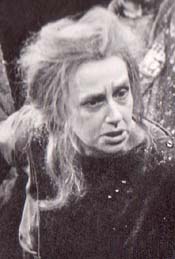
Henry VI (Part III)
By William Shakespeare
King Henry VI has negotiated a compromise with the Duke of York over the British crown. This causes Queen Margaret to join the revolting armies of the nobles. She brings an army to fight against York, and they capture him at the Battle of Wakefield. She is about to kill him, and makes a speech to rouse her troops and to humiliate York before she kills him.
QUEEN MARGARET
Brave warriors, Clifford and Northumberland,
Come, make him stand upon this molehill here
That raught at mountains with outstretched arms,
Yet parted but the shadow with his hand.
(To York.) What, was it you that would be England's king?
Was't you that revell'd in our Parliament
And made a preachment of your high descent?
Where are your mess of sons to back you now?
The wanton Edward and the lusty George?
And where's that valiant crook-back prodigy,
Dicky your boy, that with his grumbling voice
Was wont to cheer his dad in mutinies?
Or, with the rest, where is your darling Rutland?
Look, York: I stain'd this napkin with the blood
That valiant Clifford with his rapier's point
Made issue from the bosom of the boy;
And if thine eyes can water for his death,
I give thee this to dry thy cheeks withal.
Alas, poor York! but that I hate thee deadly,
I should lament thy miserable state.
I prithee, grieve, to make me merry, York.
What, hath thy fiery heart so parch'd thine entrails
That not a tear can fall for Rutland's death?
Why art thou patient, man? thou shouldst be mad;
And I, to make thee mad, do mock thee thus.
Stamp, rave, and fret, that I may sing and dance.
Thou wouldst be fee'd, I see, to make me sport:
York cannot speak, unless he wear a crown.
A crown for York! and, lords, bow low to him:
Hold you his hands, whilst I do set it on.
(Putting a paper crown on his head.)
Ay, marry, sir, now looks he like a king!
Ay, this is he that took King Henry's chair,
And this is he was his adopted heir.
But how is it that great Plantagenet
Is crown'd so soon, and broke his solemn oath?
As I bethink me, you should not be king
Till our King Henry had shook hands with death.
And will you pale your head in Henry's glory,
And rob his temples of the diadem,
Now in his life, against your holy oath?
O, 'tis a fault too too unpardonable!
Off with the crown, and with the crown his head;
And, whilst we breathe, take time to do him dead.
Peggy Ashcroft (1907-1991) said she agreed to take on the role of Margaret of Anjou in The Wars of the Roses, the Royal Shakespeare Company's massive 1963 presentation of the three parts ofHenry VI (edited to be presented in two performances) and Richard III because she was attracted to the "problem of presenting with credibility a woman who could carry her lover's severed head on to the stage and play a scene holding it in her arms." Ashcroft not only performed the scene with credibility, but she was acclaimed as one of the best things in Peter Hall and John Barton's landmark production which proved a marathon for the actors, especially on Saturdays when the cycle was performed in its entirety beginning at 10:30 in the morning and not being completed until 11:00 that night. Critics were particularly lavish in their praise of Ian Holm as the Duke of Gloucester (later Richard III) and David Warner as Henry VI, but the consensus was that Ashcroft's Margaret was the jewel in the crown of the RSC's landmark achievement, with many calling it the finest work of her blue chip career.
Ashcroft seldom performed in Shakespeare after The Wars of the Roses, her only appearance being as Queen Catherine in the rarely-performed Henry VIII for the RSC in 1969. But she made a remarkable return to the Bard's work in 1981 when she had a triumph as the Countess of Rousillon in Trevor Nunn's brilliant production of All's Well that Ends Well at the age of 74.
No comments:
Post a Comment